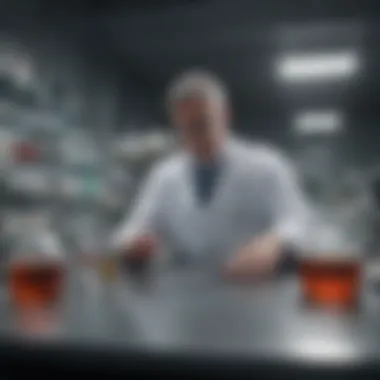Understanding Pfizer's Manufacturing Processes and Challenges


Intro
Pfizer stands at the forefront of the pharmaceutical industry, renowned not only for its innovative medical breakthroughs but also for its meticulous manufacturing processes. Understanding how Pfizer operates within the complex landscape of drug production is crucial for those interested in pharmaceutical sciences, medical professionals, and even policy makers. This section aims to give an overview of the key areas that will be discussed throughout the article, providing insight into the methodologies, technological advancements, and quality control measures that underpin Pfizer's operations.
The pharmaceutical manufacturing process is highly sophisticated. It involves a number of interconnected stages ranging from research and development to the final distribution of products. Each stage requires rigorous attention to detail, compliance with health regulations, and innovative thinking. Understanding these layers facilitates a better grasp of not just Pfizer’s approach, but the broader pharmaceutical manufacturing landscape.
As we delve into this analysis, expect to uncover not only the specific practices employed by Pfizer but also the implications of those practices on global health. In a world where rapid responses to health crises are imperative, learning about such systems will become even more relevant. Whether you are a student seeking knowledge or a professional aiming to refine your expertise, the insights provided will be valuable in grasping the intricacies of Pfizer's manufacturing processes.
Foreword to Pfizer Manufacturing
The exploration of Pfizer's manufacturing processes reveals a complex confluence of science, technology, and regulatory frameworks. Understanding these elements is essential because they establish how the company consistently delivers high-quality pharmaceutical products. This section provides an overview of Pfizer's manufacturing landscape, emphasizing its historical significance and current standing in the marketplace. Key aspects such as technological advancements and rigorous quality control practices play a vital role in shaping the company’s production capabilities.
Historical Context
Pfizer's roots trace back to 1849 when it was founded in Brooklyn, New York, by Charles Pfizer and his cousin. Initially, the company specialized in producing fine chemicals, but it expanded rapidly into the pharmaceutical realm. Significant milestones in Pfizer's history include the development of penicillin during World War II, which positioned the company as a crucial player in the antibiotic market. Over the decades, as the pharmaceutical industry evolved, so did Pfizer. The acquisition of other companies and patents allowed Pfizer to diversify its drug portfolio, becoming synonymous with high-stakes medication development. The expansion into biologics and vaccines has been a notable shift in recent years, particularly with the development of mRNA vaccines during the COVID-19 pandemic.
Current Position in the Global Market
Today, Pfizer is one of the largest pharmaceutical companies globally, consistently ranked among the top in revenue. Its extensive portfolio includes biologics, small molecules, and vaccines. Pfizer holds a significant share of the vaccine market especially after the rapid development and distribution of the COVID-19 vaccine in collaboration with BioNTech. This strategic maneuver not only showcased its innovative manufacturing capabilities but also revived interest in vaccine technology more broadly.
Pfizer's ability to adapt to changing market demands reflects its commitment to innovation and quality, positioning it effectively within the competitive landscape of global pharmaceuticals.
The current position of Pfizer in the market speaks volumes about its operational efficiencies and ability to solve public health crises. Innovations in manufacturing technologies, such as automation and continuous processes, help maintain the high standards required for production. These achievements underscore Pfizer's ongoing relevance and influence in the ever-evolving pharmaceutical sector.
Manufacturing Technologies Employed
The manufacturing technologies used by Pfizer are pivotal in shaping the efficiency and effectiveness of its operations. This section dissects the various technologies that Pfizer employs and highlights their significance in the larger context of pharmaceutical manufacturing. Understanding these technologies not only illuminates Pfizer’s production capabilities but also showcases its commitment to innovation and quality.
Biologics vs. Small Molecules
Biologics and small molecules represent two fundamental categories of drugs produced in the pharmaceutical industry. Biologics are typically large, complex molecules derived from living cells. They include products like antibodies, vaccines, and gene therapies. Pfizer’s expertise in biologics is evident in its development of therapies for diseases such as cancer and autoimmune disorders.
On the other hand, small molecules are chemically synthesized and usually consist of low molecular weight compounds. They often serve as traditional medications that are easier to manufacture. The differences in manufacturing processes for these two categories can be substantial.
- Biologics often require:
- Small Molecules often necessitate:
- Stringent regulatory approvals
- Advanced purification processes
- Special storage conditions
- Streamlined synthesis routes
- Rigorous quality control
- Efficient scaling methods
Both types of production are critical to Pfizer’s portfolio, each serving specific patient needs and offering unique therapeutic options. The choice between biologics and small molecules often relates to the target disease and the desired mechanism of action.
Automation and Robotics
In recent years, automation and robotics have transformed pharmaceutical manufacturing, and Pfizer is at the forefront of this revolution. Automating processes enhances efficiency, reduces human error, and ensures consistent product quality. The integration of robotics allows for:
- Increased precision in repetitive tasks such as filling vials and packaging products.
- Reduced cycle times, speeding up production rates without compromising quality.
- Enhanced data collection, facilitating real-time monitoring and compliance with regulatory requirements.
By employing advanced automation technologies, Pfizer can optimize its production lines. The company has invested significantly in robotic systems to ensure its manufacturing processes remain competitive and responsive to market demands.
Continuous Manufacturing Techniques
Continuous manufacturing represents a significant shift from traditional batch production methods in the pharmaceutical industry. Pfizer has embraced this innovative approach to improve efficiency and responsiveness. Continuous manufacturing involves producing drugs through a continuous flow of raw materials instead of isolated batches. This technique offers several benefits:
- Improved efficiency as materials are processed continuously, reducing wait times and idle resources.
- Enhanced product quality through consistent process conditions, leading to fewer defects.
- Greater flexibility to respond to changing market demands with minimal downtime.


Continuous manufacturing aligns with the trend toward more sustainable manufacturing practices. It reduces waste and energy consumption compared to traditional methods. Pfizer’s commitment to these innovative practices enhances its capacity to deliver medicines quickly and effectively, meeting urgent global health needs.
Quality Control and Assurance in Manufacturing
Quality control and assurance play a critical role in the manufacturing processes at Pfizer. It ensures that products, such as vaccines and pharmaceuticals, meet the necessary safety and efficacy standards before they reach the market. This part of the process is not merely operational; it is foundational to public health and trust in medical products.
Standards and Certifications
Pfizer adheres to a range of international standards and certifications that guide its manufacturing operations. The most notable is the Good Manufacturing Practice (GMP), which outlines the requirements for quality management systems. Compliance with GMP involves rigorous documentation, validation of processes, and thorough employee training to reduce errors during production. Other relevant certifications include those from the FDA and the European Medicines Agency (EMA). These agencies play a vital role in establishing trust through compliance verification. Continuous adherence to these standards underscores Pfizer's commitment to producing high-quality medicines and vaccines.
Testing Methods and Protocols
Testing methods at Pfizer encompass various analytical techniques designed to verify product quality at multiple stages. The process is meticulous and involves both in-process and final product testing. Methods such as chromatography, spectroscopy, and microbiological testing are widely employed. Each batch undergoes comprehensive testing to ensure it meets predefined specifications. Robust protocols ensure that any product deviating from these standards is either adjusted or discarded. This rigorous testing landscape protects consumers from unsafe or inefficacious products.
Auditing and Compliance Measures
Audits, both internal and external, provide an additional layer of assurance. Pfizer regularly conducts internal audits to assess adherence to quality standards, revealing areas that require improvement. External audits by regulatory agencies add another layer of scrutiny, which is vital for compliance with evolving regulations. These audits often lead to corrective actions, fostering a culture of continuous improvement. By maintaining a transparent auditing process, Pfizer demonstrates its dedication to accountability and trust in its production practices.
"Quality assurance is not an act, it is a habit". Maintaining a steadfast commitment to quality is integral not just for regulatory compliance but for fostering consumer trust.
In summary, quality control and assurance are essential in Pfizer's manufacturing operations. By following stringent standards, employing advanced testing methods, and conducting thorough audits, Pfizer assures that each product is safe, effective, and reliable.
Supply Chain Management
Supply chain management is a critical aspect of Pfizer's manufacturing processes. It ensures that the production of pharmaceutical products is efficient, cost-effective, and timely. A reliable supply chain facilitates the manufacturing process by guaranteeing that raw materials are acquired in sufficient quantities and that distribution channels are optimized for delivering finished products globally. In the pharmaceutical industry, where compliance and quality are key, supply chain management becomes even more essential.
Raw Material Sourcing
The sourcing of raw materials at Pfizer involves careful consideration of quality and compliance. Raw materials must meet stringent regulatory standards to ensure the safety and efficacy of the final products. Pfizer employs a network of approved suppliers to obtain these materials, ensuring they can be traced back to the source. This traceability is vital for maintaining compliance with FDA regulations as well as various international standards.
Additionally, Pfizer is committed to sustainability in its sourcing practices. This involves working with suppliers who prioritize ethical practices and environmental stewardship, aligning with Pfizer's broader corporate responsibility goals. It is also crucial for Pfizer to assess the risk factors related to sourcing, including geopolitical influences and market fluctuations that could affect availability.
Distribution Networks
Distribution networks at Pfizer are carefully structured to address both local and global needs. The complexity of pharmaceutical distribution necessitates a robust logistical framework. Cold chain logistics, for instance, are critical for vaccine and biologic products that require specific temperature controls throughout transportation and storage.
Pfizer leverages technology solutions to optimize its distribution networks. This includes real-time tracking systems that monitor shipments, ensuring that products are handled correctly and arrive on schedule. Partnerships with third-party logistics providers help Pfizer manage these networks efficiently. This strategy allows for flexibility in addressing high-demand situations, such as during a health crisis when rapid distribution is crucial.
Inventory Management
Effective inventory management is vital for maintaining a steady flow of pharmaceuticals while minimizing waste. Pfizer employs sophisticated inventory management systems that use real-time data and analytics to monitor stock levels across various facilities. This proactive approach allows Pfizer to respond swiftly to fluctuations in demand, ensuring that critical products are available when needed.
Moreover, inventory management at Pfizer also involves risk mitigation strategies. By conducting regular audits and assessments of inventory practices, the company can identify potential inefficiencies or risks in its warehouses and distribution centers. This continuous improvement effort supports Pfizer's commitment to compliance and helps in maintaining uninterrupted supply chains.
"A reliable supply chain not only enhances operational agility but also contributes to the overall quality and safety of pharmaceutical products."
Through these aspects of supply chain management, Pfizer has established itself as a leader in the pharmaceutical industry. The integration of sourcing, distribution, and inventory management helps ensure that the company can address both market demands and regulatory requirements effectively.
Regulatory Compliance
Regulatory compliance in pharmaceutical manufacturing holds paramount importance. It ensures that companies adhere to laws, regulations, and guidelines that govern their operations. For Pfizer, this compliance is crucial not only for maintaining product quality and safety but also for meeting the expectations of regulatory authorities and the public. Effective regulatory compliance fosters trust among stakeholders, which is vital for any pharmaceutical company aiming to succeed in a competitive landscape.
Moreover, compliance provides structure to the manufacturing processes, enabling companies like Pfizer to create products that are consistent and reliable. By adhering to regulations, Pfizer can minimize risks related to product recalls or legal issues, ultimately leading to a more sustainable business model. Understanding these regulations is a complex, yet necessary part of the pharmaceutical manufacturing world.
FDA Regulations


The Food and Drug Administration (FDA) plays a crucial role in regulating the pharmaceutical industry in the United States. Pfizer operates under strict guidelines set forth by this agency. These regulations ensure that all manufacturing practices meet required standards for safety, efficacy, and quality.
Key elements of FDA regulations include:
- Current Good Manufacturing Practice (cGMP): These guidelines govern the manufacturing process and outline the minimum requirements for facilities, equipment, and operations.
- Pre-market Approval: Before a new drug can be marketed, it must undergo a rigorous review process to assess its safety and effectiveness.
- Post-market Surveillance: Although products are approved for sale, they are still subject to monitoring for adverse reactions and manufacturing deviations.
Failure to comply with FDA regulations can result in severe consequences, such as fines, product recalls, or bans from manufacturing certain products. This creates an environment where companies prioritize regulatory compliance as a fundamental part of their operational strategy. Pfizer's commitment to meeting FDA regulations demonstrates its dedication to public health and safety.
Global Regulatory Landscape
The global regulatory landscape for pharmaceuticals presents challenges and opportunities for Pfizer. Different regions, such as the European Union, Asia, and the United States, have distinct regulatory requirements. Understanding these variations is crucial for Pfizer’s international operations.
Some aspects of the global regulatory environment include:
- Diverse Regulatory Bodies: Various countries have their own regulatory agencies. For example, the European Medicines Agency (EMA) governs pharmaceutical regulation in Europe, while the Health Canada oversees regulations in Canada.
- Harmonization Efforts: Organizations like the International Council for Harmonisation (ICH) work towards standardizing guidelines across regions to facilitate global trade.
- Emerging Market Challenges: Companies face difficulties when entering markets with developing regulatory frameworks. This can slow down the introduction of new drugs and vaccines.
Understanding the global regulatory landscape is essential for Pfizer as it navigates different markets. Compliance with international regulations not only ensures the company's products are safe and effective across borders but also builds a global reputation that reinforces trust in its brand.
Regulatory compliance is not just a legal obligation; it is a commitment to quality and safety that impacts public health directly.
Pfizer's Vaccine Production Efforts
Pfizer's vaccine production efforts represent a critical component of its manufacturing operations, especially in light of recent global health challenges. The production of vaccines is not just about creating a product; it involves intricate processes, compliance with rigorous standards, and the ability to adapt to high demand during emergencies. This section aims to elaborate on the development processes, scaling up operations, and the distribution challenges faced during crises.
Development Processes
Vaccines undergo a complex developmental pathway before they enter the production phase. Pfizer employs a thorough research and development stage that includes preclinical studies, clinical trials, and, ultimately, regulatory approval. The mRNA vaccine technology, prominently used in the COVID-19 vaccine, represents a leap forward in vaccine development. This method allows for faster production while maintaining efficacy.
The collaboration with BioNTech showcased how rapid innovation in vaccine technology can meet critical health needs. In the development phase, Pfizer focuses on:
- Patient safety: Prioritizing safety through extensive testing.
- Efficacy: Ensuring vaccines are effective against targeted pathogens.
- Regulatory compliance: Working closely with agencies like the FDA to ensure all processes meet established guidelines.
Scaling Up Operations
Once a vaccine has demonstrated safety and efficacy, scaling up operations becomes paramount. Pfizer faced the task of demonstrating its ability to manufacture millions of doses in a relatively short time. This was essential in responding to the global COVID-19 pandemic.
Key aspects of scaling operations include:
- Increased production capacity: Pfizer expanded facilities and equipment to manufacture large quantities.
- Workforce training: The company invested in training its workforce to adapt to advanced manufacturing technologies.
- Technology integration: Implementing state-of-the-art technologies to enhance production efficiency.
Pfizer's commitment to scaling operations has resulted in an unprecedented output of vaccines ready for distribution.
Distribution Challenges During Crisis
The distribution of vaccines presents unique challenges. Pfizer had to develop a comprehensive logistics strategy to ensure vaccines reached all corners of the globe. One of the significant hurdles was the need for ultra-cold storage, which is necessary for the stability of mRNA vaccines.
Some of the key distribution challenges include:
- Cold chain logistics: Developing and maintaining strict temperature controls during transport.
- Global networks: Coordinating with various global partners to establish efficient delivery channels.
- Public perception and acceptance: Managing information and outreach to ensure vaccine uptake in various populations.
"The speed and scale of the vaccine rollout required unprecedented collaboration among governments, organizations, and the pharmaceutical industry."
Pfizer's response to these challenges not only demonstrates their operational prowess but also their dedication to public health. Their manufacturing and distribution efforts have set a benchmark in vaccine production during a crisis, positioning them as a leader in the pharmaceutical industry.
Challenges in Pharmaceutical Manufacturing


The pharmaceutical industry continuously faces a myriad of challenges that can impact the efficiency and effectiveness of manufacturing processes. Understanding these challenges is crucial for any discussion on Pfizer or any significant pharmaceutical manufacturer. The dynamic and complex nature of this sector requires a comprehensive examination of various issues, such as quality control, supply chain disruptions, and regulatory hurdles. Each of these elements can profoundly affect production rates, product safety, and ultimately patient outcomes.
Quality Control Issues
Quality control is a cornerstone of pharmaceutical manufacturing. The need to ensure that every product meets high standards cannot be overstated. A lapse in quality control can lead not only to financial losses but also to serious health implications for patients. Companies like Pfizer invest heavily in quality assurance to prevent any discrepancies from occurring in the first place.
Processes often involve rigorous testing methods, including batch testing and stability studies. Moreover, advanced technologies automate several stages of quality control to minimize human errors. An effective quality control system is proactive rather than merely reactive, aiming to catch potential issues before they escalate. The regulatory scrutiny that accompanies the pharmaceutical sector further accentuates the significance of maintaining uncompromised quality.
Supply Chain Disruptions
Supply chain management can be a double-edged sword in the pharmaceutical landscape. On one hand, an efficient supply chain is vital for timely drug delivery and reducing costs. On the other hand, disruptions can lead to significant delays and shortages. Factors contributing to disruptions vary, from natural disasters to political instability, and even global pandemics like COVID-19.
Pfizer, like other firms, relies on a complex network of suppliers for raw materials. Any disruption in this network can severely hinder manufacturing capabilities. During the recent health crises, many pharmaceutical companies faced bottlenecks, significantly delaying vaccine production and distribution. Optimizing supply chains through better forecasting methods and increased collaborations with suppliers is essential for minimizing risks.
Regulatory Hurdles
Navigating the regulatory landscape is another significant challenge in pharmaceutical manufacturing. Companies must comply with a maze of regulations set forth by agencies like the FDA in the United States and EMA in Europe. These regulations encompass every aspect of the manufacturing process, from initial research and development to final product packaging and labeling.
For Pfizer, staying compliant entails conducting regular audits, maintaining comprehensive documentation, and training employees on the latest regulations. Non-compliance can result in hefty fines, product recalls, and damage to reputation. Thus, proactive engagement with regulatory bodies and continuous adaptation of manufacturing processes are essential strategies for mitigating regulatory impacts.
"Ensuring compliance is not merely about following the rules; it is an investment in the brand's integrity and future."
Addressing these challenges—quality control issues, supply chain disruptions, and regulatory hurdles—lays a foundation for effective pharmaceutical manufacturing. By understanding and tackling these elements, companies like Pfizer can enhance their operational efficiency and better meet global health needs.
Future Directions in Manufacturing
Pfizer's approach to the future of manufacturing is an integral part of its strategy. The pharmaceutical industry is under constant pressure to innovate and adapt. This section explores future directions, emphasizing innovation and sustainability, which are essential for meeting the evolving demands of healthcare.
Innovations in Technology
The landscape of pharmaceutical manufacturing is rapidly changing due to technological advancements. These innovations are critical to enhancing productivity, improving product quality, and reducing costs. Some notable trends in this domain include:
- Artificial Intelligence and Machine Learning: These technologies are reshaping data analysis. They predict trends, optimize processes, and even assist in quality assurance. By leveraging AI, Pfizer can speed up the drug development process, making it more efficient.
- 3D Printing: This can produce personalized medicine. It allows for the manufacturing of tailored dosage forms, which can significantly improve patient compliance.
- Blockchain Technology: This enhances supply chain transparency. It provides a secure, immutable record of transactions, which can help in tracking the movement of drugs from manufacture to distribution. This is particularly important for combating counterfeit drugs.
Adopting these technologies requires careful consideration and a methodical approach. Integration into existing systems poses challenges, but the long-term benefits often outweigh the initial hurdles.
Sustainability Initiatives
Environmental concerns are increasingly influencing manufacturing practices. Pfizer recognizes the importance of sustainability and has initiated several measures to minimize its environmental impact. Key initiatives include:
- Reduction of Waste and Emissions: Pfizer aims to decrease its waste output by improving manufacturing processes. This involves utilizing more efficient practices that consume less energy and generate fewer byproducts.
- Green Chemistry Practices: These focus on designing processes that reduce hazardous substances. Pfizer is investing in research to further develop eco-friendly solvents and reagents, promoting a safer production environment.
- Recycling and Resource Management: Emphasizing resource efficiency is essential. Pfizer is actively seeking ways to recycle materials used in production, thereby reducing the consumption of raw materials.
Sustainability is not just a regulatory requirement. It is a fundamental principle that can drive innovation and enhance brand reputation. As consumers become more conscious about the origin and impact of their medications, Pfizer’s commitment to sustainable practices could solidify its market leadership.
"The future of pharmaceutical manufacturing lies in technological innovation and a commitment to sustainability, impacting both the efficiency of production and public trust in healthcare."
Ending
The conclusion is a vital aspect of this article. It synthesizes insights gathered from the preceding sections. By wrapping up key findings, it helps underscore Pfizer's role in pharmaceutical manufacturing. The primary aim is to reinforce the significance of understanding manufacturing processes in the context of global health and innovation.
Summarizing Key Findings
Throughout the article, several crucial points emerge:
- Manufacturing Technologies: Pfizer employs a combination of biologics and small molecules in its products, showcasing advanced techniques like automation and continuous manufacturing.
- Quality Control and Assurance: Rigorous standards and testing protocols ensure that products meet safety and efficacy requirements, reflecting Pfizer's commitment to excellence.
- Supply Chain Management: Efficient sourcing and distribution networks play a significant role in maintaining operational effectiveness and responsiveness to global needs.
- Regulatory Compliance: Adhering to FDA and other global regulations is crucial for maintaining trust and safeguarding public health.
- Challenges Faced: The industry grapples with quality control issues, regulatory hurdles, and supply chain disruptions, especially evident in vaccine production efforts.
The art of manufacturing pharmaceuticals is intricate and demands precision. Each section contributed substantial knowledge, highlighting the relevance of technological advancements and robust quality assurance protocols in ensuring public health safety.
Implications for Future Research
Future research should focus on several key areas:
- Innovative Technologies: Investigating how emerging technologies can streamline manufacturing could enhance production efficiency. Techniques in biotechnology and digitalization offer substantial potential.
- Sustainability Practices: As environmental concerns grow, research into sustainable manufacturing practices becomes more critical. Finding a balance between production needs and ecological footprints is essential.
- Global Health Policy: Understanding how manufacturing processes impact global health policies could lead to better preparedness in future health crises.
- Consumer Impact: Research could also explore how successful manufacturing directly relates to consumer trust and product adoption rates.



